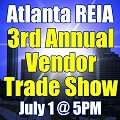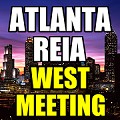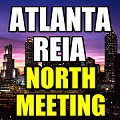Atlanta Real Estate Investors Alliance Blog
Peter Fortunato’s One Step Beyond Class on Sept 14-15 in Tampa, FL
Posted on June 25, 2013 byOne Step Beyond Class
Sat & Sun, Sept 14th & 15th in Tampa, FL
 Atlanta REIA is very excited to announce Peter Fortunato is having his 2 day One Step Beyond Class in Tampa, FL on September 14th and 15th. We are also pleased to announce that Peter and Bill Cook will be speaking at our our sister group, Tampa REIA, on Thursday, September 12th about many intermediate and advanced real estate investing strategies similar to those Pete will be teaching at the One Step Beyond Class.
Atlanta REIA is very excited to announce Peter Fortunato is having his 2 day One Step Beyond Class in Tampa, FL on September 14th and 15th. We are also pleased to announce that Peter and Bill Cook will be speaking at our our sister group, Tampa REIA, on Thursday, September 12th about many intermediate and advanced real estate investing strategies similar to those Pete will be teaching at the One Step Beyond Class.
For those of you that don’t know Peter, he is one of the greatest creative real estate investing minds in the country. Peter teaches creative real estate investing ideas, techniques and strategies that are truly unlike all other real estate trainers. What he teaches will allow anyone to quickly build an income stream from real estate assets and allow them to become financially independent by purchasing well selected real estate that will income for many years to come.
Peter has made our Atlanta REIA members and friends a very special offer for those who would like to attend his upcoming class at the unbelievable price of $350 per person (regularly $450). All you have to do is fill out the One Step Beyond Class Registration Form and fax it back to Peter at 978-922-6759 or call him at 727-397-1906 to secure your spot. If you call, be sure to mention the special code “AtlantaREIA > $350” per person found at the bottom right corner of the form to receive your discount.
Peter has generously offered this special price to help those who want to get the real estate investing education they need to be successful. You just can’t beat this great offer! Peter is the “Best of the Best” when it comes to creative real estate investing, so be sure not to miss out on this absolutely life changing opportunity.
One Step Beyond Class Registration
and get it back to Peter ASAP!
Peter will present two days of lecture and of discussion, with case studies, regarding why and how to acquire benefits using real estate. Questions and debate are highly encouraged!
Peter clearly and patiently describes cases including: Read More→
3rd Annual Vendor Trade Show & 3 Year Anniversary Celebration on July 1st
Posted on June 21, 2013 by The Atlanta Real Estate Investors Alliance (Atlanta REIA) is very excited to announce that on Monday, July 1st at 5:00 PM at the Crowne Plaza Ravinia Hotel located at 4355 Ashford Dunwoody Road in Atlanta, GA, we will be having our 3rd Annual Atlanta REIA Vendor Trade Show to celebrate our 3 Year Anniversary!
The Atlanta Real Estate Investors Alliance (Atlanta REIA) is very excited to announce that on Monday, July 1st at 5:00 PM at the Crowne Plaza Ravinia Hotel located at 4355 Ashford Dunwoody Road in Atlanta, GA, we will be having our 3rd Annual Atlanta REIA Vendor Trade Show to celebrate our 3 Year Anniversary!
This trade show and celebration is all about YOU, our members, business members, local speakers, trainers and subgroup leaders who have supported us throughout our very successful first three years! There will be plenty of opportunities for you to promote yourself, your deals and your business to our members and guests, so be sure to bring your business cards and flyers. Admission is FREE for both Atlanta REIA Members and Guests who RSVP.
In addition to all our vendors, we also have a very exciting lineup of local real estate investing experts who will be sharing their insights with you in a variety Round Table Discussions on foreclosures, short sales, mobile investing, wholesaling, negotiations, investing strategies, legal issues, real estate market analysis, renovations, comparable sales data and much more!
 On Monday, July 1st at 3:00 PM at Total Wine & More located at 124 Perimeter Center W (see map), Bob Massey will be talking about the various strategies you can use for pre-foreclosure deals. Not only will he be discussing short sales, he’s also going to be talking about how to bypass short sales altogether by buying the note. At 5:00 PM, Total Wine & More will be offering a complimentary wine tasting to all those who attend our meeting and wish to participate. There is NO CHARGE to attend this meeting.
On Monday, July 1st at 3:00 PM at Total Wine & More located at 124 Perimeter Center W (see map), Bob Massey will be talking about the various strategies you can use for pre-foreclosure deals. Not only will he be discussing short sales, he’s also going to be talking about how to bypass short sales altogether by buying the note. At 5:00 PM, Total Wine & More will be offering a complimentary wine tasting to all those who attend our meeting and wish to participate. There is NO CHARGE to attend this meeting.
- Don DeRosa on Real Estate Investing Using Smart Devices
- Russ Hiner on Wholesaling & Negotiations
- Bob Massey on Pre-Foreclosures, Shorts Sales & Note Buying
- Attorney Fred Kross on Real Estate Legal Issues
- Deborah Harris on Atlanta Real Estate Market Update
- Chris Littleton on Tenants, Landlords & Property Management
- Aaron McGinnis on Affordable, Quality Renovations
- Leslie Mathis on Systems & Delegation to Simplify Your Life
- Linda Dana on Research & Comparable Sales Data
- Elsa Palmer-Oden on Using Virtual Assistants for Real Estate Investing
 After the conclusion of the Main Meeting, we will be reconvening at the Tilted Kilt Perimeter located at 1155-B Mount Vernon Highway in Atlanta for the “Meeting-After-The-Meeting” and to celebrate our 3 Year Anniversary. In addition to the FREE FOOD Atlanta REIA and our sponsors will be providing, The Tilted Kilt will also be offering half price appetizers as well as food and drink specials for our members and guests. Come celebrate our anniversary and eat, drink, network and have fun with us as hang out late into the night!
After the conclusion of the Main Meeting, we will be reconvening at the Tilted Kilt Perimeter located at 1155-B Mount Vernon Highway in Atlanta for the “Meeting-After-The-Meeting” and to celebrate our 3 Year Anniversary. In addition to the FREE FOOD Atlanta REIA and our sponsors will be providing, The Tilted Kilt will also be offering half price appetizers as well as food and drink specials for our members and guests. Come celebrate our anniversary and eat, drink, network and have fun with us as hang out late into the night!
*Please Note: Meeting agenda is subject to change.
Atlanta REIA wants to personally thank our vendors for sponsoring our 3rd Annual Vendor Trade Show and our 3rd Anniversary Celebration at the Tilted Kilt after the meeting. Atlanta REIA Business Members and vendors can Reserve a Table Here. Thanks again sponsors!
 Craftbuilt, Inc. – We are a Metro Atlanta design-build construction firm specializing in whole-structure renovations, restorations, and new construction. No matter what the situation, we are up to the challenge! Read More>>
Craftbuilt, Inc. – We are a Metro Atlanta design-build construction firm specializing in whole-structure renovations, restorations, and new construction. No matter what the situation, we are up to the challenge! Read More>>
 Solutions Realty Network – Providing expert property management and investment services since 2003. You invest and we take care of the rest! We’re the solution to all your real estate needs. Read More>>
Solutions Realty Network – Providing expert property management and investment services since 2003. You invest and we take care of the rest! We’re the solution to all your real estate needs. Read More>>
 Advanta IRA Administration – With the help of your local Advanta IRA staff, use your IRA to invest in assets you know, understand and control, such as real estate, notes & mortgages, private placements, and much more! Read More>>
Advanta IRA Administration – With the help of your local Advanta IRA staff, use your IRA to invest in assets you know, understand and control, such as real estate, notes & mortgages, private placements, and much more! Read More>>
 Networth Realty of Atlanta, LLC – A licensed, full-service residential wholesale brokerage that specializes in finding quality wholesale properties and making them available to you. Read More>>
Networth Realty of Atlanta, LLC – A licensed, full-service residential wholesale brokerage that specializes in finding quality wholesale properties and making them available to you. Read More>>
 Goldmine Properties, Inc. – As Atlanta’s first full service real estate wholesaler, we offer wholesale property at 65% loan to value, with financing available. Purchase price and repairs are 65% of certified after repaired appraisal. Read More>>
Goldmine Properties, Inc. – As Atlanta’s first full service real estate wholesaler, we offer wholesale property at 65% loan to value, with financing available. Purchase price and repairs are 65% of certified after repaired appraisal. Read More>>
 Halperin Lyman, LLC – A transactional real property law firm devoted to providing the full spectrum of non-litigation related real estate legal and consulting services to its clientele.
Halperin Lyman, LLC – A transactional real property law firm devoted to providing the full spectrum of non-litigation related real estate legal and consulting services to its clientele.
Read More>>
 American IRA – The American IRA mission is to provide the highest level of customer service in the self-directed retirement industry.
American IRA – The American IRA mission is to provide the highest level of customer service in the self-directed retirement industry.
Read More>>
 CRS Data – Comps from MLS and FSBO’s. Our PowerTools are made of custom searches, property tax records, interactive maps, sales and mortgage info, real estate valuations, mailing lists and more. Read More>>
CRS Data – Comps from MLS and FSBO’s. Our PowerTools are made of custom searches, property tax records, interactive maps, sales and mortgage info, real estate valuations, mailing lists and more. Read More>>
 Lima One Capital, LLC – A fully capitalized, direct lender for residential real estate investors and homebuilders. We are fully capitalized and our team prides itself on closing loans quickly for our clients. Read More>>
Lima One Capital, LLC – A fully capitalized, direct lender for residential real estate investors and homebuilders. We are fully capitalized and our team prides itself on closing loans quickly for our clients. Read More>>
 The Small Business Advisor – A full service small business consulting firm specializing in QuickBooks with a wide variety of specialized services, trainings and products for small businesses. Read More>>
The Small Business Advisor – A full service small business consulting firm specializing in QuickBooks with a wide variety of specialized services, trainings and products for small businesses. Read More>>
 Pete’s Friendly Home Inspections, LLC. – Pete’s provides home inspections, radon monitoring, gas/water/septic tests, checks pools/sprinklers and any other type of inspection needed to get you that next home! Read More>>
Pete’s Friendly Home Inspections, LLC. – Pete’s provides home inspections, radon monitoring, gas/water/septic tests, checks pools/sprinklers and any other type of inspection needed to get you that next home! Read More>>
 Commercial Realty Experts – Our Team utilizes the latest information technologies, market research, and business strategies to move real estate quickly, or satisfy your particular buying needs. Read More>>
Commercial Realty Experts – Our Team utilizes the latest information technologies, market research, and business strategies to move real estate quickly, or satisfy your particular buying needs. Read More>>
 Real Estate Works 4 U – Stop paying too much and get your property tax bill lowered! Our team will manage the entire property tax appeal process from start to finish. Read More>>
Real Estate Works 4 U – Stop paying too much and get your property tax bill lowered! Our team will manage the entire property tax appeal process from start to finish. Read More>>
 Law Office of Fred P. Kross – A law firm specializing residential and commercial real estate closings, short sales, foreclosures, REOs, owner financing, contracts, probate and bankruptcy. Read More>>
Law Office of Fred P. Kross – A law firm specializing residential and commercial real estate closings, short sales, foreclosures, REOs, owner financing, contracts, probate and bankruptcy. Read More>>
 Atlanta Carpet Services, Inc. – Providing carpet, wood, vinyl, and tile, ACS is dedicated to every aspect of your floor covering needs from initial consultation to the sale and follow-up services. Read More>>
Atlanta Carpet Services, Inc. – Providing carpet, wood, vinyl, and tile, ACS is dedicated to every aspect of your floor covering needs from initial consultation to the sale and follow-up services. Read More>>
 Fuller Center for Housing of Greater Atlanta – A faith-driven, Christ-centered, non-profit organization dedicated to providing adequate shelter for people in need in the Greater Atlanta area. Read More>>
Fuller Center for Housing of Greater Atlanta – A faith-driven, Christ-centered, non-profit organization dedicated to providing adequate shelter for people in need in the Greater Atlanta area. Read More>>
 Simply Amazing Staging Atlanta – We have a proven record of converting those “For Sale” signs into “Sold” signs. We use 5 proven and time tested steps to sell your home in record time.
Simply Amazing Staging Atlanta – We have a proven record of converting those “For Sale” signs into “Sold” signs. We use 5 proven and time tested steps to sell your home in record time.
- Bowen’s Specialized Services
- Sparkle Property Cleaning LLC
- Invest Atlanta
- Sign Mafia Inc
- FirstCall Claims
- Georgia Home Deals
- American Family Insurance, Robin Mitchell Agency
- Rock Shukoor
- More Coming Soon…
Meeting-Before-The-Meeting with Bob Massey on July 1st
Posted on June 21, 2013 bywith Bob Massey
 On July 1st at the “Meeting-Before-The-Meeting” at Total Wine & More located at 124 Perimeter Center W (see map), I am giving a presentation that you don’t want to miss. We’re going to be talking about the various strategies you can use for pre-foreclosure deals. Not only are we going to be discussing short sales, we’re going to be talking about how to bypass short sales altogether and going straight after buying the note. I’m also going to show why you might be sitting on a goldmine. If you know of anyone or know how to find people with Chase loans that are in default more than 90 days, you NEED to be at this meeting!
On July 1st at the “Meeting-Before-The-Meeting” at Total Wine & More located at 124 Perimeter Center W (see map), I am giving a presentation that you don’t want to miss. We’re going to be talking about the various strategies you can use for pre-foreclosure deals. Not only are we going to be discussing short sales, we’re going to be talking about how to bypass short sales altogether and going straight after buying the note. I’m also going to show why you might be sitting on a goldmine. If you know of anyone or know how to find people with Chase loans that are in default more than 90 days, you NEED to be at this meeting!
At 5:00 PM, Total Wine & More will be offering a complimentary wine tasting to all those who attend our meeting and wish to participate. There is NO CHARGE to attend this meeting or the wine tasting for Atlanta REIA Members and guests. Thanks Total Wine & More!
RSVP for a Vendor Table at our 3rd Annual Atlanta REIA Vendor Trade Show
Posted on June 21, 2013 byVendor Trade Show & 3 Year Anniversary Celebration on July 1st
Dear Atlanta REIA Business Members:
On July 1st, Atlanta REIA will be celebrating our 3 Year Anniversary and hosting our 3rd Annual Vendor Trade Show at the Crowne Plaza Ravinia. This event will be similar to the mini trade show we do each month, it will just be BIGGER and we will have a lot more time dedicated to networking with vendors. More details are coming soon.
We are offering vendor tables this week only for $49 for Gold Business Members, $69 for Silver Business Members and $99 for Guests. In addition to reserving a vendor table, this fee will also help us provide cover the food at our special Late Nite Networking Event after the meeting.
Next week these prices will increase. Please reserve a table ASAP to not only get the best rate, but to get listed in all of our forthcoming emails for the event.
Please RSVP Now so we know you are coming and can start marketing your business to our members ASAP!
The Beginning Investors Group 1st Annual BIG Summer Cookout on June 26, 2013
Posted on June 21, 2013 by1st Annual BIG Summer Cookout!
with Special Guests, Bill Cook & Dorsie Boddiford
PLEASE NOTE: We had over 200 reservations for this event and had to shut down the FREE reservations due to the overwhelming demand. Anyone who wishes to attend that has not RSVP’d yes can still do so for only $5.00 per person to help cover food and beverage costs. Food and beverages will be limited to those people who RSVP and bring their ticket/receipt. We also encourage everyone to bring their own non-alcoholic beverages just in case we run out.
RSVP Here for Only $5.00 per person![]()
The Atlanta REIA Beginning Investors Group (BIG) is having our 1st Annual BIG Summer Cookout on Wednesday, June 26th, 2013 at 6:00 PM at the Hammond Park Pavilion located at 705 Hammond Dr NE in Sandy Springs, GA.
Come listen to Dorsie Boddiford and Bill Cook talk about how they invest real estate, why they do it, and what keeps them motivated when the going gets tough. If you are a new or “new again” investor, you do not want to miss this fun and information packed event.
We are expecting over 100 people along with experienced investors as well as our sponsors who have products and services that every investor needs for success. This event will be a great way to network, build new friendships and partnerships. There will be hot dogs, hamburgers and lots of food. You can even bring your own food and beverages if you want. We will have 3 grills going. There is a playground very close by with adult supervision.
 Halperin Lyman, LLC – A transactional real property law firm devoted to providing the full spectrum of non-litigation related real estate legal and consulting services to its clientele.
Halperin Lyman, LLC – A transactional real property law firm devoted to providing the full spectrum of non-litigation related real estate legal and consulting services to its clientele.
Read More>>
 Solutions Realty Network – Providing expert property management and investment services since 2003. You invest and we take care of the rest! We’re the solution to all your real estate needs. Read More>>
Solutions Realty Network – Providing expert property management and investment services since 2003. You invest and we take care of the rest! We’re the solution to all your real estate needs. Read More>>
 American IRA – The American IRA mission is to provide the highest level of customer service in the self-directed retirement industry. Contact us to learn how to invest in real estate with your IRA. Read More>>
American IRA – The American IRA mission is to provide the highest level of customer service in the self-directed retirement industry. Contact us to learn how to invest in real estate with your IRA. Read More>>
 Goldmine Properties, Inc. – As Atlanta’s first full service real estate wholesaler, we offer wholesale property at 65% loan to value, with financing available. Purchase price and repairs are 65% of certified after repaired appraisal. Read More>>
Goldmine Properties, Inc. – As Atlanta’s first full service real estate wholesaler, we offer wholesale property at 65% loan to value, with financing available. Purchase price and repairs are 65% of certified after repaired appraisal. Read More>>
What’s Happening at Atlanta REIA for the Week of June 24, 2013
Posted on June 20, 2013 byProperty Management Pros Share Tips & Techniques of Tenant Screening
Hosted by Leslie Mathis
 Industry studies have found that the true cost of an eviction is over $5000! This situation can frequently be avoided by carefully checking out the applicants for your rental property before you hand over the keys.
Industry studies have found that the true cost of an eviction is over $5000! This situation can frequently be avoided by carefully checking out the applicants for your rental property before you hand over the keys.
Join us at Atlanta REIA West on Monday, June 24th, where the National Tenant Network will share:
- 5 Secrets every landlord should know
- 8 steps to screening a potential resident
- Laws and regulations affecting resident screening
PLUS…
What’s Happening in the Cobb Real Estate Market?
A Market Update with George Beylouny of Silverton Mortgage.
 The Atlanta REIA West Monthly Meeting is held on the 4th Monday of each month the Cherokee Cattle Company restaurant located at 2710 Canton Road in Marietta, GA. There is currently a $5.00 cover charge for non-members to attend this event. Show up at 6:30 PM to eat and network before the meeting officially starts at 7:00 PM. There will be Door Prizes, Bonuses, Great Networking and Great Feed. Please come hungry, put on your cowboy boots and hats, bring your business cards and be there on time! Read More→
The Atlanta REIA West Monthly Meeting is held on the 4th Monday of each month the Cherokee Cattle Company restaurant located at 2710 Canton Road in Marietta, GA. There is currently a $5.00 cover charge for non-members to attend this event. Show up at 6:30 PM to eat and network before the meeting officially starts at 7:00 PM. There will be Door Prizes, Bonuses, Great Networking and Great Feed. Please come hungry, put on your cowboy boots and hats, bring your business cards and be there on time! Read More→
Hosted by Tom Boyer
 The Note Buyers Group an Atlanta REIA educational and networking subgroup led by Tom Boyer that is designed to teach real estate investors how to buy and sell the mortgage notes that secure a property rather than buying the property itself. The group’s goal is to transact deals within the group and increase our professionalism through education in a changing credit market. The agenda for this month’s meeting is (1) Haves/Wants, (2) Notes for Sale – Bring yours for analysis, (3) Smaller investment amount opportunities and (4) Strategies using seller financing to buy/sell properties, and (5) Legislation update as appropriate.
The Note Buyers Group an Atlanta REIA educational and networking subgroup led by Tom Boyer that is designed to teach real estate investors how to buy and sell the mortgage notes that secure a property rather than buying the property itself. The group’s goal is to transact deals within the group and increase our professionalism through education in a changing credit market. The agenda for this month’s meeting is (1) Haves/Wants, (2) Notes for Sale – Bring yours for analysis, (3) Smaller investment amount opportunities and (4) Strategies using seller financing to buy/sell properties, and (5) Legislation update as appropriate.
 The Note Buyers Group meets on the 4th Tuesday of each month from 6:30 PM to 9:00 PM at Olive Garden located at 2467 Cobb Parkway SE in Smyrna about 1/2 mile from I-285. If you are a new investor, this is a great opportunity to pick up pointers on what to do and what not to do when investing in notes. Atlanta REIA Members can attend at no charge.
The Note Buyers Group meets on the 4th Tuesday of each month from 6:30 PM to 9:00 PM at Olive Garden located at 2467 Cobb Parkway SE in Smyrna about 1/2 mile from I-285. If you are a new investor, this is a great opportunity to pick up pointers on what to do and what not to do when investing in notes. Atlanta REIA Members can attend at no charge.
1st Annual BIG Summer Cookout!
with Special Guests, Bill Cook & Dorsie Boddiford
PLEASE NOTE: We had over 200 reservations for this event and had to shut down the FREE reservations due to the overwhelming demand. Anyone who wishes to attend that has not RSVP’d yes can still do so for only $5.00 per person to help cover food and beverage costs. Food and beverages will be limited to those people who RSVP and bring their ticket/receipt. We also encourage everyone to bring their own non-alcoholic beverages just in case we run out.
RSVP Here for Only $5.00 per person![]()
The Atlanta REIA Beginning Investors Group (BIG) is having our 1st Annual BIG Summer Cookout on Wednesday, June 26th, 2013 at 6:00 PM at the Hammond Park Pavilion located at 705 Hammond Dr NE in Sandy Springs, GA.
Come listen to Dorsie Boddiford and Bill Cook talk about how they invest real estate, why they do it, and what keeps them motivated when the going gets tough. If you are a new or “new again” investor, you do not want to miss this fun and information packed event.
We are expecting over 100 people along with experienced investors as well as our sponsors who have products and services that every investor needs for success. This event will be a great way to network, build new friendships and partnerships. There will be hot dogs, hamburgers and lots of food. You can even bring your own food and beverages if you want. We will have 3 grills going. There is a playground very close by with adult supervision.
 Halperin Lyman, LLC – A transactional real property law firm devoted to providing the full spectrum of non-litigation related real estate legal and consulting services to its clientele.
Halperin Lyman, LLC – A transactional real property law firm devoted to providing the full spectrum of non-litigation related real estate legal and consulting services to its clientele.
Read More>>
 Solutions Realty Network – Providing expert property management and investment services since 2003. You invest and we take care of the rest! We’re the solution to all your real estate needs. Read More>>
Solutions Realty Network – Providing expert property management and investment services since 2003. You invest and we take care of the rest! We’re the solution to all your real estate needs. Read More>>
 American IRA – The American IRA mission is to provide the highest level of customer service in the self-directed retirement industry. Contact us to learn how to invest in real estate with your IRA. Read More>>
American IRA – The American IRA mission is to provide the highest level of customer service in the self-directed retirement industry. Contact us to learn how to invest in real estate with your IRA. Read More>>
 Goldmine Properties, Inc. – As Atlanta’s first full service real estate wholesaler, we offer wholesale property at 65% loan to value, with financing available. Purchase price and repairs are 65% of certified after repaired appraisal. Read More>>
Goldmine Properties, Inc. – As Atlanta’s first full service real estate wholesaler, we offer wholesale property at 65% loan to value, with financing available. Purchase price and repairs are 65% of certified after repaired appraisal. Read More>>
Hosted by Joe Thompson
 Haves and Wants is a weekly investor’s networking, brainstorming and deal making jam session hosted by Joe Thompson and held every Thursday at 5 Seasons Brewing at the Prado from 1:30 PM till approximately 3:00 PM. This group has been meeting for over 6 years and is all about networking, sharing information, doing deals and making money right now. Be sure to bring lots of your business cards and flyers and be prepared to promote your business and/or your haves, wants and deals with our group. If you are a real estate player or want to be, this is one meeting you don’t want to miss!
Haves and Wants is a weekly investor’s networking, brainstorming and deal making jam session hosted by Joe Thompson and held every Thursday at 5 Seasons Brewing at the Prado from 1:30 PM till approximately 3:00 PM. This group has been meeting for over 6 years and is all about networking, sharing information, doing deals and making money right now. Be sure to bring lots of your business cards and flyers and be prepared to promote your business and/or your haves, wants and deals with our group. If you are a real estate player or want to be, this is one meeting you don’t want to miss!
 5 Seasons Brewing is located at 5600 Roswell Rd (map) inside the Perimeter at the “Prado” in Sandy Springs. The all natural, organic food at the 5 Seasons is excellent and the hand-crafted beer is even better! Come out and eat, drink, network and share your deals with us! There is no charge to attend this meeting for Atlanta REIA Members or guests. Please come early and stay late. We would love to have you!
5 Seasons Brewing is located at 5600 Roswell Rd (map) inside the Perimeter at the “Prado” in Sandy Springs. The all natural, organic food at the 5 Seasons is excellent and the hand-crafted beer is even better! Come out and eat, drink, network and share your deals with us! There is no charge to attend this meeting for Atlanta REIA Members or guests. Please come early and stay late. We would love to have you!
 We have two special guest speakers for the Cash Cows Commercial Real Estate Group on Thursday, June 27th. Our first is Ernie Eden, the top Commercial Real Estate Broker in Georgia with vast expertise in Apartments. We will also have Bill Ham who was a 1st time student of David Lindahl. Bill is now a trainer for David Lindahl the Apartment Guru and Bill has purchased over 400 hundred apartment units in Macon, GA using Dave’s System. Come join us and learn how you can too!
We have two special guest speakers for the Cash Cows Commercial Real Estate Group on Thursday, June 27th. Our first is Ernie Eden, the top Commercial Real Estate Broker in Georgia with vast expertise in Apartments. We will also have Bill Ham who was a 1st time student of David Lindahl. Bill is now a trainer for David Lindahl the Apartment Guru and Bill has purchased over 400 hundred apartment units in Macon, GA using Dave’s System. Come join us and learn how you can too!
 The Cash Cows Commercial Real Estate Group is an educational, networking and call to action subgroup, led by Steve Brown for new, intermediate and advanced investors with a serious interest in purchasing commercial real estate. The Cash Cows group meets on the 4th Thursday of each month at 11:30 AM, before the Haves & Wants Meeting, at 5 Seasons Brewing located at 5600 Roswell Rd in Sandy Springs, GA at the Prado. If you yearn to learn, come learn to earn!
The Cash Cows Commercial Real Estate Group is an educational, networking and call to action subgroup, led by Steve Brown for new, intermediate and advanced investors with a serious interest in purchasing commercial real estate. The Cash Cows group meets on the 4th Thursday of each month at 11:30 AM, before the Haves & Wants Meeting, at 5 Seasons Brewing located at 5600 Roswell Rd in Sandy Springs, GA at the Prado. If you yearn to learn, come learn to earn!
Coming to the Wild Wild West Group on June 24th
Posted on June 19, 2013 byProperty Management Pros Share Tips & Techniques of Tenant Screening
Hosted by Leslie Mathis
 Industry studies have found that the true cost of an eviction is over $5000! This situation can frequently be avoided by carefully checking out the applicants for your rental property before you hand over the keys.
Industry studies have found that the true cost of an eviction is over $5000! This situation can frequently be avoided by carefully checking out the applicants for your rental property before you hand over the keys.
National Tenant Network will share:
- 5 Secrets every landlord should know
- 8 steps to screening a potential resident
- Laws and regulations affecting resident screening
PLUS…
What’s Happening in the Cobb Real Estate Market?
A Market Update with George Beylouny of Silverton Mortgage.
What’s Happening at Atlanta REIA for the Week of June 17, 2013
Posted on June 17, 2013 by The Beginning Investors Group (BIG) meets this month on Monday, June 17th at 6:30 PM at Hudson Grille located at 6317 Roswell Rd NE in Sandy Springs, GA. This meeting is FREE for Atlanta REIA Members. Guests and Non-Members can pay $20.00 at the door or RSVP Online for $10.00. If you Join Atlanta REIA before attending or at the door, you can attend at no charge.
The Beginning Investors Group (BIG) meets this month on Monday, June 17th at 6:30 PM at Hudson Grille located at 6317 Roswell Rd NE in Sandy Springs, GA. This meeting is FREE for Atlanta REIA Members. Guests and Non-Members can pay $20.00 at the door or RSVP Online for $10.00. If you Join Atlanta REIA before attending or at the door, you can attend at no charge.
As a new or “new again” investor, have you ever asked yourself what you’ll do with your first or next property once you buy it? Will you quick turn it? Fix and flip it? Rent it? Lease-option it? Sell it with owner financing? How long will it take you to sell or fill your new investment property? These are common questions many new investors face when considering their first purchase.
Not having a clear “exit strategy” is an obstacle that often prevents many new investors from doing their first deal. If you would like to get a better understanding of how to quickly sell or fill your investment properties once you buy them, be sure to join us on Monday, June 17th at BIG where real estate expert and trainer, Don DeRosa, will be teaching our new investors how to market for tenants and buyers and how to choose thei right exit strategies for maximum profits and minimal out of pocket expenses.
Don will teach you:
- How to choose the correct Exit Strategy so you can buy the house right
- Marketing the property for a quick sale
- Numerous proven methods of Don’s to put more dollars in YOUR pocket
- Questions & Answers with the audience
- All this and much more…
Don will use his 17 years of real estate investing experience to help you overcome many of the challenges you may be facing as a new investor. After his presentation, we will do some buyer and seller role playing to give you a chance to practice your negotiation skills. So come out and join us. Come early and stay late for Late Night Networking after the meeting.
Meets Tuesday, June 18th at NOON at
1010 Brookdale Dr, East Point, GA 30344
 On Tuesday, June 18th at Noon, the Onsite Renovation Group meets at 1010 Brookdale Dr, East Point, GA 30344. Come out to Onsite Renovation Group as we explore the changing market of East Point, GA. Forces have been changing the face of the Atlanta Real Estate Market and East Point has not escaped the tidal wave of rising sales. Join us and see what a sub-$200k resale and a moderate renovation looks like in the new market.
On Tuesday, June 18th at Noon, the Onsite Renovation Group meets at 1010 Brookdale Dr, East Point, GA 30344. Come out to Onsite Renovation Group as we explore the changing market of East Point, GA. Forces have been changing the face of the Atlanta Real Estate Market and East Point has not escaped the tidal wave of rising sales. Join us and see what a sub-$200k resale and a moderate renovation looks like in the new market.
This is a project that was sourced to the investor by New Western Acquisitions and is being renovated by Craftbuilt. We should be deep into framing and rough mechanical installations at the time of the meeting.
 The Atlanta REIA Onsite Renovation Group (ORG), led by Aaron McGinnis of Craftbuilt Properties, is an new educational and networking group that focuses on the acquisition, renovation and retail resale (fix and flip) of single family residential homes inside the I-285 perimeter and the in-town neighborhoods. The purpose of this group is to allow both new and experienced rehabbers and investors to meet, network and share knowledge and experience with “hands on” access to real property. The Onsite Renovation Group meets on the 3rd Tuesday of each month at NOON at an active renovation site, build site or rental property which will vary from month to month. There is currently no charge to attend these meeting.
The Atlanta REIA Onsite Renovation Group (ORG), led by Aaron McGinnis of Craftbuilt Properties, is an new educational and networking group that focuses on the acquisition, renovation and retail resale (fix and flip) of single family residential homes inside the I-285 perimeter and the in-town neighborhoods. The purpose of this group is to allow both new and experienced rehabbers and investors to meet, network and share knowledge and experience with “hands on” access to real property. The Onsite Renovation Group meets on the 3rd Tuesday of each month at NOON at an active renovation site, build site or rental property which will vary from month to month. There is currently no charge to attend these meeting.
An Evening with a
Real Estate Attorney
with Special Guest Attorney Fred Kross
 Attorney Fred Kross will be our special guest speaker on Wednesday, June 19th at 6:30 PM at the Atlanta REIA North Meeting located at 1960 Skylar Hill Dr, Suite D in Buford, Georgia. Fred is a real estate closing attorney, a bankruptcy attorney as well as a short sale negotiation specialist. Fred will be joining us at the meeting to discuss the closing process, closing “gotchas”, legal and title issues, and much more. He will also do his best to answer any burning legal questions you may have. So come out and join us for a rare opportunity to spend an evening with a real estate attorney!
Attorney Fred Kross will be our special guest speaker on Wednesday, June 19th at 6:30 PM at the Atlanta REIA North Meeting located at 1960 Skylar Hill Dr, Suite D in Buford, Georgia. Fred is a real estate closing attorney, a bankruptcy attorney as well as a short sale negotiation specialist. Fred will be joining us at the meeting to discuss the closing process, closing “gotchas”, legal and title issues, and much more. He will also do his best to answer any burning legal questions you may have. So come out and join us for a rare opportunity to spend an evening with a real estate attorney!
Fred will answer your questions such as…
- How much are typical closing costs?
- How do I calculate/estimate closing costs before I buy?
- Do you do back-to-back/simultaneous “dry” closings?
- Do you do “subject-to” closings and what are the risks?
- Do you close transactions into “land trusts”?
- Which is a better form of owner financing… a “Agreement for Deed” or “Wrap Around Mortgage”?
- Do do you short sale negotiations for your clients and if so, how much does it cost?
- What are the title risks of buying REOs or houses at Auction? Can you get clear title?
- What are the most common issues that cause a closing to “blow up”?
- Do new laws and regulations prevent us from providing “owner financing” to new owner occupants of our investment properties?
- Are there legal ways to flip and/or assign REOs without waiting 90 days?
- How will a tenant/buyer’s bankruptcy affect my investment properties?
 Atlanta REIA North is a of the Atlanta Real Estate Investors Alliance that meets on the 3rd Wednesday of each month at from 6:30 PM to 8:30 PM at 1960 Skylar Hill Dr, Suite D, Buford, Georgia in North Gwinnett County just a few miles from the Mall of Georgia. Like the Main Atlanta REIA Monthly Meeting, this subchapter will be led by Dustin Griffin and will focus on a wide variety of cutting edge real estate investing strategies with a special emphasis on Internet Marketing and Technology for the modern day “High Tech Investor”. The cost is $5.00 at the door for non-members.
Atlanta REIA North is a of the Atlanta Real Estate Investors Alliance that meets on the 3rd Wednesday of each month at from 6:30 PM to 8:30 PM at 1960 Skylar Hill Dr, Suite D, Buford, Georgia in North Gwinnett County just a few miles from the Mall of Georgia. Like the Main Atlanta REIA Monthly Meeting, this subchapter will be led by Dustin Griffin and will focus on a wide variety of cutting edge real estate investing strategies with a special emphasis on Internet Marketing and Technology for the modern day “High Tech Investor”. The cost is $5.00 at the door for non-members.
 After the conclusion of the Atlanta REIA North Meeting (after 9:30 PM), we will be reconvening at the Mall of Georgia located at 3250 Woodward Crossing Blvd in Buford, GA for the “Meeting after the Meeting”. We may arrive late if the Atlanta REIA Meeting runs late. So please come eat, drink, network and have fun with us as hang out late into the night!
After the conclusion of the Atlanta REIA North Meeting (after 9:30 PM), we will be reconvening at the Mall of Georgia located at 3250 Woodward Crossing Blvd in Buford, GA for the “Meeting after the Meeting”. We may arrive late if the Atlanta REIA Meeting runs late. So please come eat, drink, network and have fun with us as hang out late into the night!
Hosted by Joe Thompson
 Haves and Wants is a weekly investor’s networking, brainstorming and deal making jam session hosted by Joe Thompson and held every Thursday at 5 Seasons Brewing at the Prado from 1:30 PM till approximately 3:00 PM. This group has been meeting for over 6 years and is all about networking, sharing information, doing deals and making money right now. Be sure to bring lots of your business cards and flyers and be prepared to promote your business and/or your haves, wants and deals with our group. If you are a real estate player or want to be, this is one meeting you don’t want to miss!
Haves and Wants is a weekly investor’s networking, brainstorming and deal making jam session hosted by Joe Thompson and held every Thursday at 5 Seasons Brewing at the Prado from 1:30 PM till approximately 3:00 PM. This group has been meeting for over 6 years and is all about networking, sharing information, doing deals and making money right now. Be sure to bring lots of your business cards and flyers and be prepared to promote your business and/or your haves, wants and deals with our group. If you are a real estate player or want to be, this is one meeting you don’t want to miss!
 5 Seasons Brewing is located at 5600 Roswell Rd (map) inside the Perimeter at the “Prado” in Sandy Springs. The all natural, organic food at the 5 Seasons is excellent and the hand-crafted beer is even better! Come out and eat, drink, network and share your deals with us! There is no charge to attend this meeting for Atlanta REIA Members or guests. Please come early and stay late. We would love to have you!
5 Seasons Brewing is located at 5600 Roswell Rd (map) inside the Perimeter at the “Prado” in Sandy Springs. The all natural, organic food at the 5 Seasons is excellent and the hand-crafted beer is even better! Come out and eat, drink, network and share your deals with us! There is no charge to attend this meeting for Atlanta REIA Members or guests. Please come early and stay late. We would love to have you!
Property Management Pros Share Tips & Techniques of Tenant Screening
Hosted by Leslie Mathis
 Industry studies have found that the true cost of an eviction is over $5000! This situation can frequently be avoided by carefully checking out the applicants for your rental property before you hand over the keys.
Industry studies have found that the true cost of an eviction is over $5000! This situation can frequently be avoided by carefully checking out the applicants for your rental property before you hand over the keys.
Join us at Atlanta REIA West on Monday, June 24th, where the National Tenant Network will share:
- 5 Secrets every landlord should know
- 8 steps to screening a potential resident
- Laws and regulations affecting resident screening
PLUS…
What’s Happening in the Cobb Real Estate Market?
A Market Update with George Beylouny of Silverton Mortgage.
 The Atlanta REIA West Monthly Meeting is held on the 4th Monday of each month the Cherokee Cattle Company restaurant located at 2710 Canton Road in Marietta, GA. There is currently a $5.00 cover charge for non-members to attend this event. Show up at 6:30 PM to eat and network before the meeting officially starts at 7:00 PM. There will be Door Prizes, Bonuses, Great Networking and Great Feed. Please come hungry, put on your cowboy boots and hats, bring your business cards and be there on time! Read More→
The Atlanta REIA West Monthly Meeting is held on the 4th Monday of each month the Cherokee Cattle Company restaurant located at 2710 Canton Road in Marietta, GA. There is currently a $5.00 cover charge for non-members to attend this event. Show up at 6:30 PM to eat and network before the meeting officially starts at 7:00 PM. There will be Door Prizes, Bonuses, Great Networking and Great Feed. Please come hungry, put on your cowboy boots and hats, bring your business cards and be there on time! Read More→
Don DeRosa is Speaking on Selling Houses Fast at BIG on June 17, 2013
Posted on June 10, 2013 by The Beginning Investors Group (BIG) meets this month on Monday, June 17th at 6:30 PM at Hudson Grille located at 6317 Roswell Rd NE in Sandy Springs, GA. This meeting is FREE for Atlanta REIA Members. Guests and Non-Members can pay $20.00 at the door or RSVP Online for $10.00. If you Join Atlanta REIA before attending or at the door, you can attend at no charge.
The Beginning Investors Group (BIG) meets this month on Monday, June 17th at 6:30 PM at Hudson Grille located at 6317 Roswell Rd NE in Sandy Springs, GA. This meeting is FREE for Atlanta REIA Members. Guests and Non-Members can pay $20.00 at the door or RSVP Online for $10.00. If you Join Atlanta REIA before attending or at the door, you can attend at no charge.
As a new or “new again” investor, have you ever asked yourself what you’ll do with your first or next property once you buy it? Will you quick turn it? Fix and flip it? Rent it? Lease-option it? Sell it with owner financing? How long will it take you to sell or fill your new investment property? These are common questions many new investors face when considering their first purchase.
Not having a clear “exit strategy” is an obstacle that often prevents many new investors from doing their first deal. If you would like to get a better understanding of how to quickly sell or fill your investment properties once you buy them, be sure to join us on Monday, June 17th at BIG where real estate expert and trainer, Don DeRosa, will be teaching our new investors how to market for tenants and buyers and how to choose thei right exit strategies for maximum profits and minimal out of pocket expenses.
Don will teach you:
- How to choose the correct Exit Strategy so you can buy the house right
- Marketing the property for a quick sale
- Numberous proven methods of Don’s to put more dollars in YOUR pocket
- Questions & Answers with the audience
- All this and much more…
Don will use his 17 years of real estate investing experience to help you overcome many of the challenges you may be facing as a new investor. After his presentation, we will do some buyer and seller role playing to give you a chance to practice your negotiation skills. So come out and join us. Come early and stay late for Late Night Networking after the meeting.
Russ Hiner is Speaking at the I Love Marketing Group on June 12, 2013
Posted on June 10, 2013 by How many of you have leads coming to you everyday at a low price and high quality? What is the most effective marketing in today real estate market? How many of you are marketing on line? Do you have a website? Do you have a video? When are you going to get one?
How many of you have leads coming to you everyday at a low price and high quality? What is the most effective marketing in today real estate market? How many of you are marketing on line? Do you have a website? Do you have a video? When are you going to get one?
Video is hot. Websites are the way to go. Russ Hiner has plenty of videos out there and will show you how you can too. Russ will be speaking at the I Love Marketing Group on Wednesday, June 12th at 7PM at Ariana Afghan Cuisine located at 5785 Roswell Rd NE, Atlanta, GA (map) where he will demonstrate and talk about the benefits of Google AdWords and marketing videos.
Here are a few reasons why you may need to attend this meeting…
- You Want To Figure This Whole Internet Thing Out.
- You Will Be Presented With The Latest In Online Marketing.
- Learn How To Generate An Organic Profile In The Market Place.
- Get You Name And Website On The First Page On Google.
- Get More High Quality Leads Coming To You.
What’s Happening at Atlanta REIA for the Week of June 10, 2013
Posted on June 10, 2013 bywith Special Guest, Russ Hiner
 How many of you have leads coming to you everyday at a low price and high quality? What is the most effective marketing in today real estate market? How many of you are marketing on line? Do you have a website? Do you have a video? When are you going to get one?
How many of you have leads coming to you everyday at a low price and high quality? What is the most effective marketing in today real estate market? How many of you are marketing on line? Do you have a website? Do you have a video? When are you going to get one?
Video is hot. Websites are the way to go. Russ Hiner has plenty of videos out there and will show you how you can too. Russ will be speaking at the I Love Marketing Group on Wednesday, June 12th at 7PM at Ariana Afghan Cuisine located at 5785 Roswell Rd NE, Atlanta, GA (map) where he will demonstrate and talk about the benefits of Google AdWords and marketing videos.
Here are a few reasons why you may need to attend this meeting…
- You Want To Figure This Whole Internet Thing Out.
- You Will Be Presented With The Latest In Online Marketing.
- Learn How To Generate An Organic Profile In The Market Place.
- Get You Name And Website On The First Page On Google.
- Get More High Quality Leads Coming To You.
Learn marketing from someone who is doing it and using it now!
Hosted by Joe Thompson
 Haves and Wants is a weekly investor’s networking, brainstorming and deal making jam session hosted by Joe Thompson and held every Thursday at 5 Seasons Brewing at the Prado from 1:30 PM till approximately 3:00 PM. This group has been meeting for over 6 years and is all about networking, sharing information, doing deals and making money right now. Be sure to bring lots of your business cards and flyers and be prepared to promote your business and/or your haves, wants and deals with our group. If you are a real estate player or want to be, this is one meeting you don’t want to miss!
Haves and Wants is a weekly investor’s networking, brainstorming and deal making jam session hosted by Joe Thompson and held every Thursday at 5 Seasons Brewing at the Prado from 1:30 PM till approximately 3:00 PM. This group has been meeting for over 6 years and is all about networking, sharing information, doing deals and making money right now. Be sure to bring lots of your business cards and flyers and be prepared to promote your business and/or your haves, wants and deals with our group. If you are a real estate player or want to be, this is one meeting you don’t want to miss!
 5 Seasons Brewing is located at 5600 Roswell Rd (map) inside the Perimeter at the “Prado” in Sandy Springs. The all natural, organic food at the 5 Seasons is excellent and the hand-crafted beer is even better! Come out and eat, drink, network and share your deals with us! There is no charge to attend this meeting for Atlanta REIA Members or guests. Please come early and stay late. We would love to have you!
5 Seasons Brewing is located at 5600 Roswell Rd (map) inside the Perimeter at the “Prado” in Sandy Springs. The all natural, organic food at the 5 Seasons is excellent and the hand-crafted beer is even better! Come out and eat, drink, network and share your deals with us! There is no charge to attend this meeting for Atlanta REIA Members or guests. Please come early and stay late. We would love to have you!
Hosted by Reggie Jackson & Gordon Catts
 The Atlanta REIA South Monthly Meeting, run by Reggie Jackson and Gordon Catts, is held on the 2nd Thursday of each month at 6:30 PM at The Barbecue Kitchen located at 1437 Virginia Avenue in East Point. Please show up at 6:30 PM to eat and network before the meeting officially starts at 7:00 PM. Atlanta REIA Members may attend at no charge. Guests may attend for $5.00. We hope you will come out and eat, network, learn and have fun with us!
The Atlanta REIA South Monthly Meeting, run by Reggie Jackson and Gordon Catts, is held on the 2nd Thursday of each month at 6:30 PM at The Barbecue Kitchen located at 1437 Virginia Avenue in East Point. Please show up at 6:30 PM to eat and network before the meeting officially starts at 7:00 PM. Atlanta REIA Members may attend at no charge. Guests may attend for $5.00. We hope you will come out and eat, network, learn and have fun with us!
On June 15th, 2013 from 9AM – 5PM
1960 Skylar Hill Dr, Suite D, Buford, GA
 On Saturday, June 15th from 9 AM to 5 PM at 1960 Skylar Hill Dr, Suite D, in Buford, GA, Russ Hiner will be teaching the Negotiations 101 Workshop to really help you sharpen your negotiation skills. This professional training will be fast-paced, high-energy and is going to get you over the hump in your negotiation techniques. Your life depends on the knowledge that you will learn at this training and will surely improve as a result!
On Saturday, June 15th from 9 AM to 5 PM at 1960 Skylar Hill Dr, Suite D, in Buford, GA, Russ Hiner will be teaching the Negotiations 101 Workshop to really help you sharpen your negotiation skills. This professional training will be fast-paced, high-energy and is going to get you over the hump in your negotiation techniques. Your life depends on the knowledge that you will learn at this training and will surely improve as a result!
 The Beginning Investors Group (BIG) meets this month on Monday, June 17th at 6:30 PM at Hudson Grille located at 6317 Roswell Rd NE in Sandy Springs, GA. This meeting is FREE for Atlanta REIA Members. Guests and Non-Members can pay $20.00 at the door or RSVP Online for $10.00. If you Join Atlanta REIA before attending or at the door, you can attend at no charge.
The Beginning Investors Group (BIG) meets this month on Monday, June 17th at 6:30 PM at Hudson Grille located at 6317 Roswell Rd NE in Sandy Springs, GA. This meeting is FREE for Atlanta REIA Members. Guests and Non-Members can pay $20.00 at the door or RSVP Online for $10.00. If you Join Atlanta REIA before attending or at the door, you can attend at no charge.
As a new or “new again” investor, have you ever asked yourself what you’ll do with your first or next property once you buy it? Will you quick turn it? Fix and flip it? Rent it? Lease-option it? Sell it with owner financing? How long will it take you to sell or fill your new investment property? These are common questions many new investors face when considering their first purchase.
Not having a clear “exit strategy” is an obstacle that often prevents many new investors from doing their first deal. If you would like to get a better understanding of how to quickly sell or fill your investment properties once you buy them, be sure to join us on Monday, June 17th at BIG where real estate expert and trainer, Don DeRosa, will be teaching our new investors how to market for tenants and buyers and how to choose thei right exit strategies for maximum profits and minimal out of pocket expenses.
Don will teach you:
- How to choose the correct Exit Strategy so you can buy the house right
- Marketing the property for a quick sale
- Numberous proven methods of Don’s to put more dollars in YOUR pocket
- Questions & Answers with the audience
- All this and much more…
Don will use his 17 years of real estate investing experience to help you overcome many of the challenges you may be facing as a new investor. After his presentation, we will do some buyer and seller role playing to give you a chance to practice your negotiation skills. So come out and join us. Come early and stay late for Late Night Networking after the meeting.
Meets Tuesday, June 18th at NOON at
1010 Brookdale Dr, East Point, GA 30344
 On Tuesday, June 18th at Noon, the Onsite Renovation Group meets at 1010 Brookdale Dr, East Point, GA 30344. Come out to Onsite Renovation Group as we explore the changing market of East Point, GA. Forces have been changing the face of the Atlanta Real Estate Market and East Point has not escaped the tidal wave of rising sales. Join us and see what a sub-$200k resale and a moderate renovation looks like in the new market.
On Tuesday, June 18th at Noon, the Onsite Renovation Group meets at 1010 Brookdale Dr, East Point, GA 30344. Come out to Onsite Renovation Group as we explore the changing market of East Point, GA. Forces have been changing the face of the Atlanta Real Estate Market and East Point has not escaped the tidal wave of rising sales. Join us and see what a sub-$200k resale and a moderate renovation looks like in the new market.
This is a project that was sourced to the investor by New Western Acquisitions and is being renovated by Craftbuilt. We should be deep into framing and rough mechanical installations at the time of the meeting.
 The Atlanta REIA Onsite Renovation Group (ORG), led by Aaron McGinnis of Craftbuilt Properties, is an new educational and networking group that focuses on the acquisition, renovation and retail resale (fix and flip) of single family residential homes inside the I-285 perimeter and the in-town neighborhoods. The purpose of this group is to allow both new and experienced rehabbers and investors to meet, network and share knowledge and experience with “hands on” access to real property. The Onsite Renovation Group meets on the 3rd Tuesday of each month at NOON at an active renovation site, build site or rental property which will vary from month to month. There is currently no charge to attend these meeting.
The Atlanta REIA Onsite Renovation Group (ORG), led by Aaron McGinnis of Craftbuilt Properties, is an new educational and networking group that focuses on the acquisition, renovation and retail resale (fix and flip) of single family residential homes inside the I-285 perimeter and the in-town neighborhoods. The purpose of this group is to allow both new and experienced rehabbers and investors to meet, network and share knowledge and experience with “hands on” access to real property. The Onsite Renovation Group meets on the 3rd Tuesday of each month at NOON at an active renovation site, build site or rental property which will vary from month to month. There is currently no charge to attend these meeting.
The Onsite Renovation Group Meets Tuesday, June 18th at NOON
Posted on June 4, 2013 by On Tuesday, June 18th at Noon, the Onsite Renovation Group meets at 1010 Brookdale Dr, East Point, GA 30344. Come out to Onsite Renovation Group as we explore the changing market of East Point, GA. Forces have been changing the face of the Atlanta Real Estate Market and East Point has not escaped the tidal wave of rising sales. Join us and see what a sub-$200k resale and a moderate renovation looks like in the new market.
On Tuesday, June 18th at Noon, the Onsite Renovation Group meets at 1010 Brookdale Dr, East Point, GA 30344. Come out to Onsite Renovation Group as we explore the changing market of East Point, GA. Forces have been changing the face of the Atlanta Real Estate Market and East Point has not escaped the tidal wave of rising sales. Join us and see what a sub-$200k resale and a moderate renovation looks like in the new market.
This is a project that was sourced to the investor by New Western Acquisitions and is being renovated by Craftbuilt. We should be deep into framing and rough mechanical installations at the time of the meeting.
 The Atlanta REIA Onsite Renovation Group (ORG), led by Aaron McGinnis of Craftbuilt Properties, is an new educational and networking group that focuses on the acquisition, renovation and retail resale (fix and flip) of single family residential homes inside the I-285 perimeter and the in-town neighborhoods. The purpose of this group is to allow both new and experienced rehabbers and investors to meet, network and share knowledge and experience with “hands on” access to real property. The Onsite Renovation Group meets on the 3rd Tuesday of each month at NOON at an active renovation site, build site or rental property which will vary from month to month. There is currently no charge to attend these meeting.
The Atlanta REIA Onsite Renovation Group (ORG), led by Aaron McGinnis of Craftbuilt Properties, is an new educational and networking group that focuses on the acquisition, renovation and retail resale (fix and flip) of single family residential homes inside the I-285 perimeter and the in-town neighborhoods. The purpose of this group is to allow both new and experienced rehabbers and investors to meet, network and share knowledge and experience with “hands on” access to real property. The Onsite Renovation Group meets on the 3rd Tuesday of each month at NOON at an active renovation site, build site or rental property which will vary from month to month. There is currently no charge to attend these meeting.











